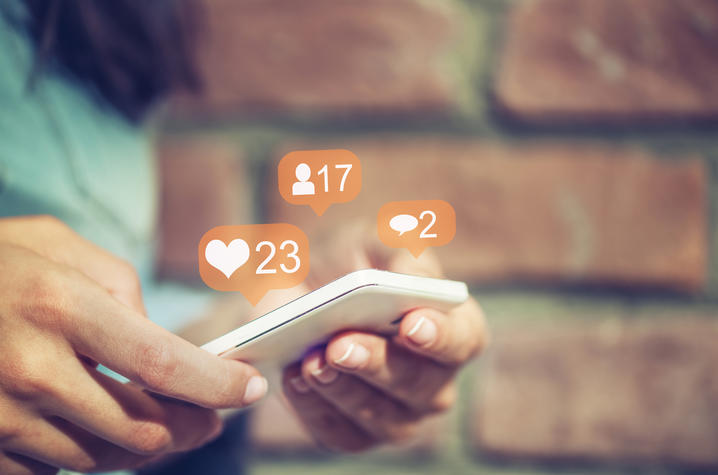What a New Study Reveals About Selfies and Teenage Body Image

LEXINGTON, Ky. (May 29, 2018) — From Facebook and Twitter, to Instagram and Snapchat, it's no secret social media has become a common form of communication, but have you ever left your feeds feeling bad about yourself? If so, you’re not alone, according to a new study conducted by Ilyssa Salomon, doctoral student, and Christia Spears Brown, professor of psychology, at the University of Kentucky.
Social media presents a unique set of challenges for those who are feeling vulnerable. Teenagers are the first generation that cannot imagine life without the internet. Some of that interaction can be positive, allowing teens to find a sense of belonging, but less known is the negative impact of social media on body image.
"If you walk by any group of teenagers, you will notice that most of them are intently staring at their phone. Almost all of them, regardless of social class, race or gender, are on social media," Brown said. "Social media has become ubiquitous among teens, even prominent in the lives of teens too young to get their own account. The problem is that researchers are still unsure of the effects of social media use on teens’ development."
On a quest for more concrete facts and figures, Salomon and Brown developed a cross-sectional study titled, "The Selfie Generation: Examining the Relationship Between Social Media Use and Early Adolescent Body Image." Together, they explored the potentially damaging effects of social media exposure among teenagers.
"We were concerned that social media use, with its emphasis on evaluating how people look, might be associated with how early adolescents feel about their own bodies. Previous research has shown that the majority of girls in middle school are unhappy with their bodies. And yet, we also know that they spend every day looking at highly sexualized, highly curated pictures of other people on social media," Brown said.
Visual platforms deliver the tools that allow teens to earn approval for their appearance and compare themselves to others. For some, especially girls, what starts as a fun way to document and share experiences can turn into an obsession.
"Adolescents are especially vulnerable because they are undergoing a lot of physical, social and psychological changes that are a normal part of growing up. With puberty, adolescents’ bodies are changing in many different ways," explained Brown. "They are more focused on the opinions of their peers than ever before. All of these developmental changes place early adolescents at greater risk for developing negative body image, and in the worst-case scenario, subsequently eating disorders."
In the survey, three popular types of social media were examined: Twitter, Facebook and Instagram.
The focus group included 142 middle schoolers across four different schools. The sample was very ethnically diverse, with 45 percent white students, 22 percent Latino students, 19 percent black students and 13 percent multiracial students. They ranged in age from 11-14, with 94 percent of them being either 12 or 13.
Based on results from the study, nearly 80 percent of teens, by age 13, have at least one social media account. Most of them spend approximately five hours a week on their account; scrolling through feeds, posting pictures and interacting with other users.
Perhaps even more interesting, according to the study, teens who reported posting more pictures on social media had a heightened awareness of their appearance, which was related to feeling more negative about their body.
"Some teens may be more at risk than others for some negative effects of social media —s pecifically, for adolescents who are particularly focused on others for approval, and for adolescent girls who are already facing societal pressures to have an ideal body. Spending a lot of time on social media taking and posting selfies is associated with thinking about their bodies more frequently and thinking more negatively about their bodies," Brown said.
Teens today are often referred to as the "selfie generation." The act of taking and posting an image of yourself is an interesting phenomenon that zeroes in on physical appearance. That begs the question, does self-imaging boost confidence or lower self-esteem? The answer isn't exactly clear. However, Salomon and Brown said they discovered taking and posting selfies can be associated with negative outcomes, but not for all teenagers.
"It is really teens who are focused on others for approval and try to adapt their behavior to fit in, as well as adolescent girls, who seem to show the strongest links between social media and body image," Salomon explained. "Second, our results found that boys and girls in our sample did not differ in attitudes about their body. A lot of previous research has shown that girls have negative body image, but boys don’t think much about their appearance. Our results suggest otherwise, that boys are also unhappy with their bodies."
In conclusion, those who were more invested in their selfies, spending more time choosing a photo or editing it, were more dissatisfied with their bodies.
So what should be done with this knowledge? Salomon and Brown said their target audience is anyone invested in the well-being and health of adolescents, but they hope the results will spark an important conversation between parents and their children.
"Parents should understand that social media is a very relevant social context for modern adolescents, and like anything else, it will have costs and benefits. One cost seems to be that posting a lot of pictures of yourself and using social media frequently is related to negative body image for some adolescents. Parents should have conversations with their teens about body image and the risks associated with certain types of social media use."
A paper detailing the study has been released as a preprint in the Journal of Early Adolescence.




